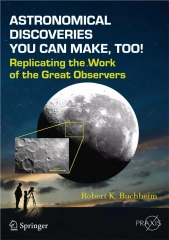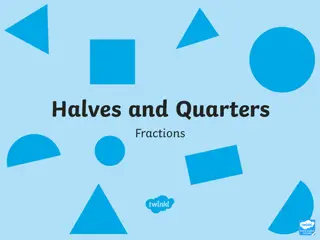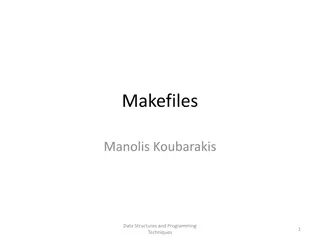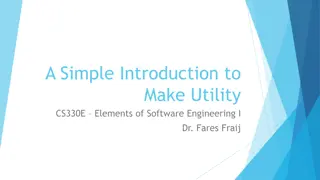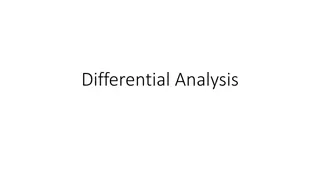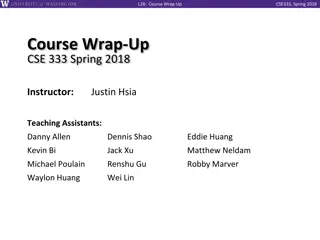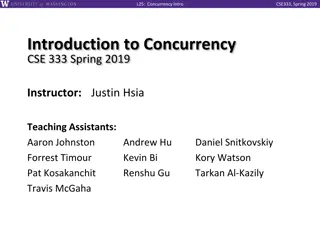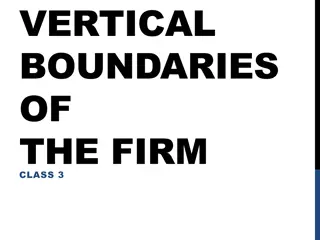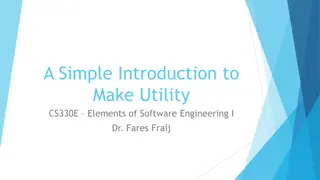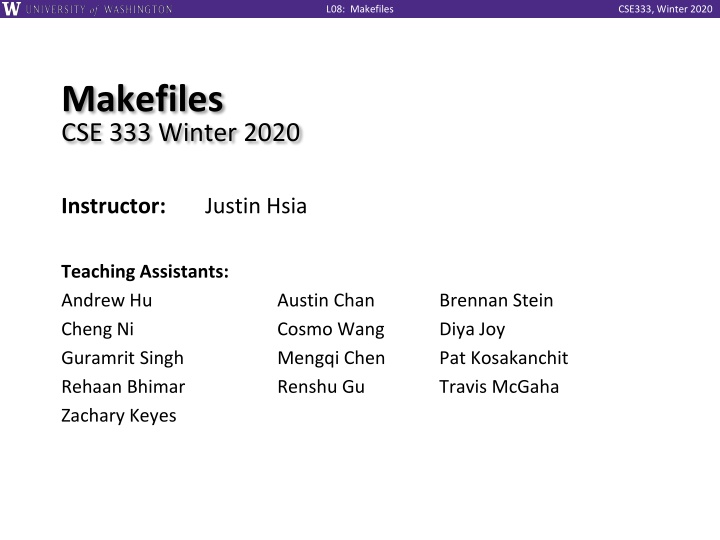
Understanding Makefiles in CSE333 Winter 2020
Explore the fundamentals of Makefiles in CSE333 Winter 2020, focusing on make, build tools, software building processes, and real-world applications. Learn about controlling compilation, automating tasks, and managing dependencies efficiently. Gain insights into creating efficient build processes for larger projects.
Download Presentation

Please find below an Image/Link to download the presentation.
The content on the website is provided AS IS for your information and personal use only. It may not be sold, licensed, or shared on other websites without obtaining consent from the author. If you encounter any issues during the download, it is possible that the publisher has removed the file from their server.
You are allowed to download the files provided on this website for personal or commercial use, subject to the condition that they are used lawfully. All files are the property of their respective owners.
The content on the website is provided AS IS for your information and personal use only. It may not be sold, licensed, or shared on other websites without obtaining consent from the author.
E N D
Presentation Transcript
L08: Makefiles CSE333, Winter 2020 Makefiles CSE 333 Winter 2020 Instructor: Justin Hsia Teaching Assistants: Andrew Hu Cheng Ni Guramrit Singh Rehaan Bhimar Zachary Keyes Austin Chan Cosmo Wang Mengqi Chen Renshu Gu Brennan Stein Diya Joy Pat Kosakanchit Travis McGaha
L08: Makefiles CSE333, Winter 2020 Administrivia Exercise 7 posted yesterday, due Monday Read a directory and open/copy text files found there Copy exactly and only the bytes in the file(s). No extra output. Good warm-up for Homework 2 due in two weeks (2/6) File system crawler, indexer, and search engine Spec and starter files will be pushed out tonight 2
L08: Makefiles CSE333, Winter 2020 Lecture Outline Make and Build Tools Makefile Basics C++ Preview 3
L08: Makefiles CSE333, Winter 2020 make make is a classic program for controlling what gets (re)compiled and how Many other such programs exist (e.g.ant, maven, IDE projects ) make has tons of fancy features, but only two basic ideas: 1) Scripts for executing commands 2) Dependencies for avoiding unnecessary work To avoid just teaching makefeatures (boring and narrow), let s focus more on the concepts 4
L08: Makefiles CSE333, Winter 2020 Building Software Programmers spend a lot of time building Creating programs from source code Both programs that they write and other people write Programmers like to automate repetitive tasks Repetitive: gcc -Wall -g -std=c11 -o widget foo.c bar.c baz.c Retype this every time: Use up-arrow or history: (still retype after logout) Have an alias or bash script: Have a Makefile: (you re ahead of us) 5
L08: Makefiles CSE333, Winter 2020 Real Build Process On larger projects, you can t or don t want to have one big (set of) command(s) that redoes everything every time you change anything: 1) If gccdidn t combine steps for you, you d need to preprocess, compile, and link on your own (along with anything you used to generate the C files) 2) If source files have multiple outputs (e.g. javadoc), you d have to type out the source file name(s) multiple times 3) You don t want to have to document the build logic when you distribute source code 4) You don t want to recompile everything every time you change something (especially if you have 105-107 files of source code) A script can handle 1-3 (use a variable for filenames for 2), but 4 is trickier 6
L08: Makefiles CSE333, Winter 2020 Recompilation Management The theory behind avoiding unnecessary compilation is a dependency dag (directed, acyclic graph) To create a target ?, you need sources ?1,?2, ,?? and a command ? that directly or indirectly uses the sources It ? is newer than every source (file-modification times), assume there is no reason to rebuild it Recursive building: if some source ?? is itself a target for some other sources, see if it needs to be rebuilt Cycles make no sense ! 7
L08: Makefiles CSE333, Winter 2020 Theory Applied to C foo.h foo.c bar.c Source files foo.o bar.o Object files Statically-linked libraries libZ.a bar Executable Compiling a .c creates a .o the .o depends on the .c and all included files (.h, recursively/transitively) 8
L08: Makefiles CSE333, Winter 2020 Theory Applied to C foo.h foo.c bar.c Source files foo.o bar.o Object files Statically-linked libraries libZ.a bar Executable Compiling a .c creates a .o the .o depends on the .c and all included files (.h, recursively/transitively) An archive (library, .a) depends on included .o files 9
L08: Makefiles CSE333, Winter 2020 Theory Applied to C foo.h foo.c bar.c Source files foo.o bar.o Object files Statically-linked libraries libZ.a bar Executable Compiling a .c creates a .o the .o depends on the .c and all included files (.h, recursively/transitively) An archive (library, .a) depends on included .o files Creating an executable ( linking ) depends on .o files and archives Archives linked by -L<path> -l<name> (e.g.-L. -lfoo to get libfoo.a from current directory) 10
L08: Makefiles CSE333, Winter 2020 Theory Applied to C foo.h foo.c bar.c Source files foo.o bar.o Object files Statically-linked libraries libZ.a bar Executable If one .c file changes, just need to recreate one .o file, maybe a library, and re-link If a .h file changes, may need to rebuild more Many more possibilities! 11
L08: Makefiles CSE333, Winter 2020 Lecture Outline Make and Build Tools Makefile Basics C++ Preview 12
L08: Makefiles CSE333, Winter 2020 make Basics A makefile contains a bunch of triples: target: sources Tab command Colon after target is required Command lines must start with a TAB, NOT SPACES Multiple commands for same target are executed in order Can split commands over multiple lines by ending lines with \ Example: foo.o: foo.c foo.h bar.h gcc -Wall -o foo.o -c foo.c 13
L08: Makefiles CSE333, Winter 2020 Using make bash$ make -f <makefileName> target Defaults: If no -f specified, use a file named Makefile If no target specified, will use the first one in the file Will interpret commands in your default shell Set SHELL variable in makefile to ensure Target execution: Check each source in the source list: If the source is a target in the makefile, then process it recursively If some source does not exist, then error If any source is newer than the target (or target does not exist), run command (presumably to update the target) 14
L08: Makefiles CSE333, Winter 2020 make Variables You can define variables in a makefile: All values are strings of text, no types Variable names are case-sensitive and can t contain : , # , = , or whitespace Example: CC = gcc CFLAGS = -Wall -std=c11 foo.o: foo.c foo.h bar.h $(CC) $(CFLAGS) -o foo.o -c foo.c Advantages: Easy to change things (especially in multiple commands) Can also specify on the command line: (e.g.make foo.o CC=clang CFLAGS=-g) 15
L08: Makefiles CSE333, Winter 2020 More Variables It s common to use variables to hold lists of filenames: OBJFILES = foo.o bar.o baz.o widget: $(OBJFILES) gcc -o widget $(OBJFILES) clean: rm $(OBJFILES) widget *~ clean is a convention Remove generated files to start over from just the source It s funny because the target doesn t exist and there are no sources, but it works because: The target doesn t exist, so it must be remade by running the command These phony targets have several uses, such as all 16
L08: Makefiles CSE333, Winter 2020 all Example all: prog B.class someLib.a # notice no commands this time prog: foo.o bar.o main.o gcc o prog foo.o bar.o main.o B.class: B.java javac B.java someLib.a: foo.o baz.o ar r foo.o baz.o foo.o: foo.c foo.h header1.h header2.h gcc -c -Wall foo.c # similar targets for bar.o, main.o, baz.o, etc... 17
L08: Makefiles CSE333, Winter 2020 Writing a Makefile Example talk program (find files on web with lecture slides) main.c speak.h speak.c shout.h shout.c 18
L08: Makefiles CSE333, Winter 2020 Revenge of the Funny Characters Special variables: $@ for target name $^ for all sources $< for left-most source Lots more! see the documentation Examples: # CC and CFLAGS defined above widget: foo.o bar.o $(CC) $(CFLAGS) -o $@ $^ foo.o: foo.c foo.h bar.h $(CC) $(CFLAGS) -c $< 19
L08: Makefiles CSE333, Winter 2020 And more There are a lot of built-in rules see documentation There are suffix rules and pattern rules Example: %.class: %.java javac $< # we need the $< here Remember that you can put any shell command even whole scripts! You can repeat target names to add more dependencies Often this stuff is more useful for reading makefiles than writing your own (until some day ) 20
L08: Makefiles CSE333, Winter 2020 Lecture Outline Make and Build Tools Makefile Basics C++ Preview 21
L08: Makefiles CSE333, Winter 2020 Programming Terminology Review Encapsulation and Abstraction: Hiding implementation details (restricting access) and associating behaviors (methods) with data Polymorphism: The provision of a single interface to entities of different types Generics: Algorithms written in terms of types to-be- specified-later 22
L08: Makefiles CSE333, Winter 2020 Encapsulation and Abstraction (C) Used header file conventions and the static specifier to separate private functions, definitions, and constants from public Used forward-declared structs and opaque pointers (i.e.void*) to hide implementation-specific details Can t associate behaviors with encapsulated state Functions that operate on a LinkedList not actually tied to the struct Really difficult to mimic implemented primarily via coding conventions 23
L08: Makefiles CSE333, Winter 2020 Encapsulation and Abstraction (C++) Support for classes and objects! Public, private, and protected access specifiers Methods and instance variables ("this") (Multiple!) inheritance Polymorphism Static polymorphism: multiple functions or methods with the same name, but different argument types (overloading) Works for all functions, not just class members Dynamic (subtype) polymorphism: derived classes can override methods of parents, and methods will be dispatched correctly 24
L08: Makefiles CSE333, Winter 2020 Generics (C) Generic linked list and hash table by using void* payload Function pointers to generalize different behavior for data structures Comparisons, deallocation, pickling up state, etc. Emulated generic data structures primarily by disabling type system 25
L08: Makefiles CSE333, Winter 2020 Generics (C++) Templates facilitate generic data types Parametric polymorphism: same idea as Java generics, but different in details, particularly implementation A vector of ints: vector<int> x; A vector of floats: vector<float> x; A vector of (vectors of floats): vector<vector<float>> x; Specialized casts to increase type safety 26
L08: Makefiles CSE333, Winter 2020 Namespaces (C) Names are global and visible everywhere Can use static to prevent a name from being visible outside a source file (as close as C gets to private ) Naming conventions help avoid collisions in the global namespace e.g.LinkedList_Allocate, HTIterator_Next, etc. Avoid collisions primarily via coding conventions 27
L08: Makefiles CSE333, Winter 2020 Namespaces (C++) Explicit namespaces! The linked list module could define an LL namespace while the hash table module could define an HT namespace Both modules could define an Iterator class One would be globally named LL::Iterator and the other would be globally named HT::Iterator Classes also allow duplicate names without collisions Classes can also define their own pseudo-namespace, very similar to Java static inner classes 28
L08: Makefiles CSE333, Winter 2020 Standard Library (C) C does not provide any standard data structures We had to implement our own linked list and hash table Hopefully, you can use somebody else s libraries But C s lack of abstraction, encapsulation, and generics means you ll probably end up tweak them or tweak your code to use them YOU implement the data structures that you need 29
L08: Makefiles CSE333, Winter 2020 Standard Library (C++) Generic containers: bitset, queue, list, associative array (including hash table), deque, set, stack, and vector And iterators for most of these A string class: hides the implementation of strings Streams: allows you to stream data to and from objects, consoles, files, strings, and so on Generic algorithms: sort, filter, remove duplicates, etc. 30
L08: Makefiles CSE333, Winter 2020 Error Handling (C) Error handling is a pain Define error codes and return them Either directly return or via a global like errno No type checking: does 1 mean EXIT_FAILURE or true? Customers and implementors need to constantly test return values e.g. if a() calls b(), which calls c() a depends on b to propagate an error in c back to it Error handling is a pain mixture of coding conventions and discipline 31
L08: Makefiles CSE333, Winter 2020 Error Handling (C++) Supports exceptions! try / throw / catch If used with discipline, can simplify error processing If used carelessly, can complicate memory management Consider: a() calls b(), which calls c() If c() throws an exception that b()doesn t catch, you might not get a chance to clean up resources allocated inside b() We will largely avoid in 333 You still benefit from having more interpretable errors! But much C++ code still needs to work with C & old C++ libraries, so still uses return codes, exit(), etc. 32
L08: Makefiles CSE333, Winter 2020 Some Tasks Still Hurt in C++ Memory management C++ has no garbage collector You still have to manage memory allocation & deallocation and track It s still possible to have leaks, double frees, and so on But there are some things that help Smart pointers Classes that encapsulate pointers and track reference counts Deallocate memory when the reference count goes to zero C++ s constructors and destructors permit a pattern known as Resource Allocation Is Initialization (RAII) Useful for releasing memory, locks, database transactions, etc. 33
L08: Makefiles CSE333, Winter 2020 Some Tasks Still Hurt in C++ C++ doesn t guarantee type or memory safety You can still: Forcibly cast pointers between incompatible types Walk off the end of an array and smash memory Have dangling pointers Conjure up a pointer to an arbitrary address of your choosing 34
L08: Makefiles CSE333, Winter 2020 How to Think About C++ Set of styles and ways to use C++ Style guides Good styles and robust engineering practices Set of styles and ways to use C 35
L08: Makefiles CSE333, Winter 2020 Or In the hands of a disciplined programmer, C++ is a powerful tool But if you re not so disciplined about how you use C++ 36






